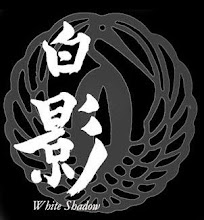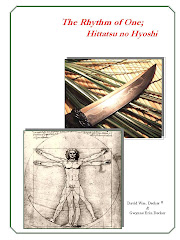 If this paragraph sounds familiar it is because I copped it from my first book. Having re-read it I felt that I could not improve upon it substantially.
If this paragraph sounds familiar it is because I copped it from my first book. Having re-read it I felt that I could not improve upon it substantially.“There are many things that you can only learn by training with an instructor, so take the time to find a good one. Videos and books will only take you part of the way. In fact, I recommend using these training aids as secondary sources to reinforce your primary training with an instructor. Too often it is impossible to make the necessary leap of understanding from one still photo to the next in a book. The techniques may be confusing or impossible to duplicate because of this gap in the illustrations or in your understanding. I am sure that this book will have its share of similar shortcomings. Videos may show techniques from one angle only, or neglect to tell you to watch the feet or the hips where the real power is being developed. This is usually not an attempt at hiding techniques. There is just too much to remember, and sometimes too much is taken for granted. Even a highly skilled instructor may overlook the basics that a technique was built upon. Remember that they have performed the techniques tens of thousands of times until that apparently missing basic ingredient is ingrained into the way they move[1].”
 Do not be misled or romanced by an instructor’s title. Too often those teachers who insist upon being called master, guro, datu, professor, shihan, hanshi, etc. have very tenuous, or even spurious, claims to the distinction. Instead of spending your time reading the certificates plastered on the walls, watch to see how the teacher moves. Not only when executing techniques, but see how he or she moves among the students. Do they show fear or respect for the teacher, and is that respect freely given or extorted? I have known too many students who began martial arts at an early age and were easily intimidated. As they grew older they found that what they thought was respect for their teacher was in reality fear. Once they outgrew the fear their respect soured into disrespect. Despite the lost admiration and general dissatisfaction, they often continued to stay with the school because of the many years they had invested. Sometimes it is necesary to admit you made a wrong choice and leave, rather than stick around expecting things to change. If you find that you advance in rank only because other students continually come and go, making you senior, then that ought to be your sign. It is never too late to move on and find a new teacher and get a fresh start! Trust me on this.
Do not be misled or romanced by an instructor’s title. Too often those teachers who insist upon being called master, guro, datu, professor, shihan, hanshi, etc. have very tenuous, or even spurious, claims to the distinction. Instead of spending your time reading the certificates plastered on the walls, watch to see how the teacher moves. Not only when executing techniques, but see how he or she moves among the students. Do they show fear or respect for the teacher, and is that respect freely given or extorted? I have known too many students who began martial arts at an early age and were easily intimidated. As they grew older they found that what they thought was respect for their teacher was in reality fear. Once they outgrew the fear their respect soured into disrespect. Despite the lost admiration and general dissatisfaction, they often continued to stay with the school because of the many years they had invested. Sometimes it is necesary to admit you made a wrong choice and leave, rather than stick around expecting things to change. If you find that you advance in rank only because other students continually come and go, making you senior, then that ought to be your sign. It is never too late to move on and find a new teacher and get a fresh start! Trust me on this.There is another side to this. Do not expect your teacher to be a master of every art! If you make expectations of him that he cannot live up to then you have done him a disservice. An honest teacher will tell you when he reaches his limitations. A good teacher will send you to someone who can advance your training. A lesser teacher will not admit to being unskilled in any art. To maintain his student base he will attend a seminar or two and proclaim himself the master of yet another art. He never admits to the students that his mastery consists of eight hours of standing around watching, combined with some training, and four hours of beer drinking afterwards. If you think that sounds too cynical, then you need to take a dose of reality and call me in the morning.
David Decker






No comments:
Post a Comment